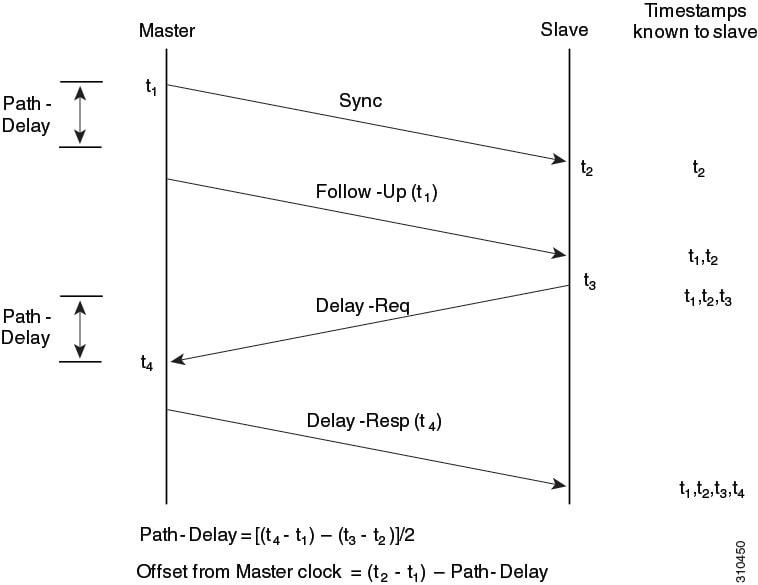Table 4. Feature History Table
|
Feature Name
|
Release Information
|
Description
|
|
PTP Delay Asymmetry
|
Release 7.3.1
|
Any delays on Precision Time Protocol (PTP) paths can impact PTP accuracy and in turn impact clock settings for all devices
in a network. This feature allows you to configure the static asymmetry such that the delay is accounted for and the PTP synchronization
remains accurate.
The delay-symmetry command is introduced for this feature.
|
|
PTP Delay Asymmetry
|
Release 7.6.1
|
You can configure static asymmetry such that any delays on Precision Time Protocol (PTP) paths are accounted for, and the
PTP synchronization remains accurate, thus avoiding any impact to clock settings for all devices in a network.
|
Configure PTP delay asymmetry to offset the static delays on a PTP path that occur due to different route selection for forward
and reverse PTP traffic. Delays can also be due to any node having different delay for ingress or egress path. These delays
can impact PTP accuracy due to the asymmetry in PTP. With this feature, you can enable a higher degree of accuracy in the
PTP server performance leading to better synchronization between real-time clocks of the devices in a network.
Configuration of this delay asymmetry provides an option to configure static delays on a client clock for every server clock.
You can configure this delay value in microseconds and nanoseconds. Configured PTP delay asymmetry is also synchronized with
the Servo algorithm.

Note
|
-
If you configure multiple PTP delay asymmetries for the same PTP profile, the latest PTP delay asymmetry that you configure
is applied to the PTP profile.
-
For G8275.1 and G8275.2 PTP profiles, PTP delay asymmetry is supported for both, client port and dynamic port that act as
a client.
-
Fixed delay can be measured by using any test and measurement tool. Fixed delay can be compensated by using the positive or
negative values. For example, if the fixed delay is +10 nanoseconds, configure -10 nanoseconds to compensate the fixed delay.
|
A positive value indicates that the server-to-client propagation time is longer than the client-to-server propagation time,
and conversely for negative values.
Supported PTP Profiles
The following PTP profiles support the configuration of PTP delay asymmetry:
Restrictions
-
PTP delay asymmetry can be configured only on the PTP port of the grandmaster clock, which can either be a boundary clock
or an ordinary clock.
-
PTP delay asymmetry is supported for delay compensation of fixed cables and not for variable delay in the network.
-
PTP delay asymmetry can be configured within the range of 3 microseconds and -3 microseconds or 3000 nanoseconds and -3000
nanoseconds.
Configuration
To configure PTP delay asymmetry:
-
Configure an interface with PTP.
-
Configure PTP delay asymmetry on the client side.
Configuration Example
/* Configure an interface with PTP. */
Router# configure
Router(config)# interface HundredGigE 0/1/0/0
Router(config-if)# ptp
/* Configure PTP delay asymmetry on the client side. */
Router(config-if-ptp)# delay-asymmetry 3 microseconds
Router(config-if-ptp)# commit
Running Configuration
interface preconfigure HundredGigE 0/1/0/0
ptp
delay-asymmetry 3 microseconds
Verification
To verify if PTP delay asymmetry is applied, use the show ptp foreign-masters command:
Router# show ptp foreign-masters
Sun Nov 1 10:19:21.874 UTC
Interface HundredGigE0/1/0/0 (PTP port number 1)
IPv4, Address 209.165.200.225, Unicast
Configured priority: 1
Configured clock class: None
Configured delay asymmetry: 3 microseconds <- configured variable delay asymmetry value
Announce granted: every 2 seconds, 300 seconds
Sync granted: 16 per-second, 300 seconds
Delay-resp granted: 16 per-second, 300 seconds
Qualified for 2 minutes, 45 seconds
Clock ID: 80e01dfffe8ab73f
Received clock properties:
Domain: 0, Priority1: 128, Priority2: 128, Class: 6
Accuracy: 0x22, Offset scaled log variance: 0xcd70
Steps-removed: 1, Time source: GPS, Timescale: PTP
Frequency-traceable, Time-traceable
Current UTC offset: 37 seconds (valid)
Parent properties:
Clock ID: 80e01dfffe8ab73f
Port number: 1
To validate the approximate compensated delay value, use the show ptp platform servo command:
Router# show ptp platform servo
Mon Jun 27 22:32:44.912 UTC
Servo status: Running
Servo stat_index: 2
Device status: PHASE_LOCKED
Servo Mode: Hybrid
Servo log level: 0
Phase Alignment Accuracy: -2 ns
Sync timestamp updated: 18838
Sync timestamp discarded: 0
Delay timestamp updated: 18837
Delay timestamp discarded: 0
Previous Received Timestamp T1: 1657002314.031435081 T2: 1657002314.031436686 T3: 1657002314.026815770 T4: 1657002314.026814372
Last Received Timestamp T1: 1657002314.031435081 T2: 1657002314.031436686 T3: 1657002314.088857790 T4: 1657002314.088856392
Offset from master: 0 secs, 1502 nsecs <<--compensated value shows 1.5 microseconds because the asymmetry configured under the interface is
3 microseconds.->>
Mean path delay : 0 secs, 103 nsecs
setTime():0 stepTime():0 adjustFreq():2
Last setTime: 0.000000000 flag:0 Last stepTime:0 Last adjustFreq:-5093


 Feedback
Feedback